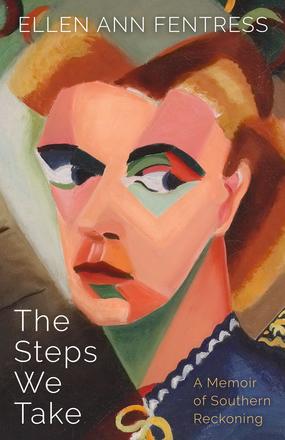
The Steps We Take
A Memoir of Southern Reckoning
A clear-eyed account of white southern womanhood
Description
Chosen as Mississippi’s 2024 Great Read for Adults by the Library of Congress Centers for the Book
Ellen Ann Fentress is a veteran writer for the New York Times, the Washington Post, and The Atlantic. She’s also a seasoned southern woman, specifically a white Mississippi one. “Women do a lot for free, no matter the era, no matter the location,” she observes in The Steps We Take: A Memoir of Southern Reckoning. As a good southern woman, Fentress felt a calling to help others. As a teenager, she volunteered as a March of Dimes quarter collector and sang hymns at a soup-and-salvation homeless shelter. Later, she married, reared two daughters, renovated a 1941 Colonial home, practiced her French, and served as the bookkeeper for her husband’s business. She followed the scripts she was handed by society.
But there were the convenient lies and silences that she and most southern—make that American—white women have settled on in the name of convention and, to be honest, inertia. For Fentress, her dodges both behind her front door and beyond became impossible to miss. Eventually, along with claiming a personal second act at midlife, she realized the most urgent community work she could do was to spur truth-telling about the history she knew well and participated in. She was one of the nearly one million students in the South enrolled in all-white “segregation academies,” a sweeping movement away from public education that continues to warp the Deep South today. To document and engage with this history, she founded the Admissions Project: Racism and the Possible in Southern Schools, which has been featured in the Washington Post, Slate, Forbes and other publications.
The Steps We Take tells how one woman reckons with both a region’s history and her own past. Through a lens ranging from intimate to the widely human, through moments painful and darkly comic, Fentress casts a penetrating light on what it means to be a white southern woman today.
Reviews
"In The Steps We Take, Fentress holds a mirror to the archetype (or stereotype) of the helpful, ever-cheerful, and often self-deceiving southern white woman. What results is a meaningful examination of whiteness and womanhood, privilege and charity, all baked into the author’s story of personal transformation."
- Lauren Rhoades, host of Mississippi Public Broadcasting’s Mississippi Arts Hour
"Fentress’s book is an attempt not only to tell her story but to offer a way forward from the blindness and consequent harm caused by the easy acceptance of inequality in American society. Always the hope is that exposure to such earnest stories will persuade others toward the type of self-reflection and change in individual attitudes and behaviors that will move the needle on America’s racial and gender issues in positive directions."
- Paulette Boudreaux, author of Mulberry: A Novel
"In this arresting and clear-eyed memoir of help offered and help denied, Ellen Ann Fentress lays bare the southern systems that pollute our best impulses: Christian coercion, entrenched racial hierarchies, and unrelenting female self-sacrifice. While the message is stark and at times heartbreaking, the messenger is Fentress's confessional, warm, and often hilarious prose. Reading The Steps We Take, I felt both exposed and embraced, as after any honest conversation with a true friend."
- Katy Simpson Smith, author of The Everlasting: A Novel and The Weeds: A Novel
"From her perspective as a white Mississippian, journalist and filmmaker Fentress writes candidly about her growing consciousness of race, responsibility, and community. . . . A forthright reflection on the effects of segregation."
- Kirkus Reviews
"Ellen Ann Fentress, like many civic-minded, community spirit-filled southern women before her, has spent her life doing good. But in The Steps We Take, she has dared to ask the perilous question: Did she do good enough? Even more daring and perilous is her answer: No. Over the course of the narrative, she confronts not only her personal past, but the dark and complicated past of the region of the country in which she grew up and still lives. This is a courageous and tough-minded work. It is also an important one."
- Lili Anolik, author of Hollywood's Eve: Eve Babitz and the Secret History of L.A.
"Who knew that the testimony of a do-gooder could be this refreshing, this amusing, this self-aware? Ellen Ann Fentress has nailed the subject of voluntarism, while eloquently showing how the New South and the Old South bleed into each other when it comes to women and Black people."
- Phillip Lopate, author of A Mother's Tale